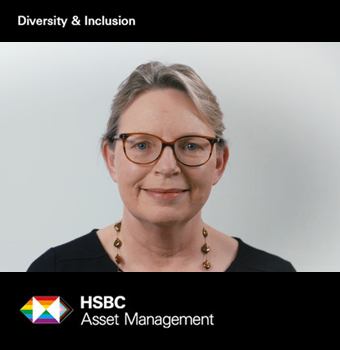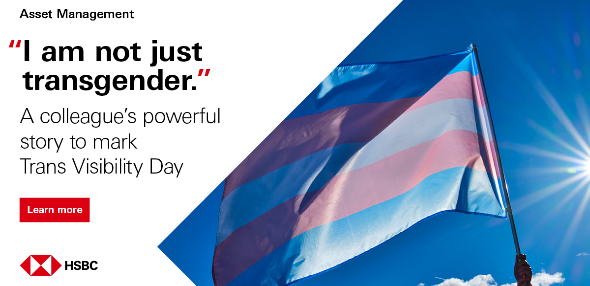Despite 80 per cent of people acquiring a disability while in employment, the majority hide in plain sight. Only 6.3 per cent of them, according to Business Disability Forum, self declares as disabled. Without being aware, we may disregard the needs of our colleagues and make their contribution more difficult. Our goal is to highlight the importance of mainstreaming disability issues and encourage open dialogue about what it is to be different and how departments in Asset Management can support each team member’s needs. We are committed to the UK Government’s Disability Confidence scheme, of which the bank is classed as a Grade 3 - “Leader” and ensure regular training for new employees is implemented. We hope to undertake our own DC assessment specifically for Asset Management in 2023 so we can be fully compliant.
Timothy Roberts, our co-lead also co-chairs the Disability workstream at the Diversity Project (www.diversityproject.com). These initiatives help not only ensure a strong culture of disability inclusion in HSBC Asset Management and also the wider HSBC, but also in the Investment Industry in a meaningful way.
In 2022, many of our employees were featured in National Inclusion Week and Disability Confident #WeAre role model programme. We published a variety of posts on social media around Disability and Neurodiversity. We commemorated the International Day of Persons with Disabilities (IDOPWD) by observing a Purple Sock Day and publishing articles in our internal newsletter to highlight disability awareness.
Our Disability workstream is co-chaired by Timothy J Roberts (Tim) and Jason W Hampton.
Tim is profoundly deaf and has been since birth due to his mother contracting Rubella during pregnancy. A common occurrence in the 1970’s, which led to many babies being born with disabilities. Tim is part of the HSBC Ability network and London Pride committee as well as co-chairing the Disability workstream of the wider external Diversity Project, which seeks to improve diversity within the Investment Industry.
Jason was one of the 80 per cent of individuals who develop some form of disability in adult life. An infection left Jason being single sided deaf. Jason is a long standing Governor at an under privileged 6th form college that prides itself on lifting students up to achieve goals and has dedicated learning infrastructure for students with disabilities.
Our Mission
We are committed to creating a workspace where people of all abilities can succeed without barriers. Our goal is to increase awareness, foster a culture of inclusion and help people in HSBC Asset Management remove impediments in business structures that prevent people with disabilities from thriving and contributing value.
With one in four US adults and one in five UK adults living with disability, being inclusive is not just a compliance task or the right thing to do, it is also good business. We believe that over 1 billion people worldwide with disabilities and long-term conditions enhance the social and economic health of our societies. By increasing access to people with differing abilities, we open ourselves up to new ways of thinking and higher levels of innovation.
Driving awareness and inclusion
Despite 80% of people acquiring a disability while in employment, the majority hide in plain sight. Only 6.3% of them, according to Business Disability Forum, self declares as disabled.
Without being aware, we disregard the needs of our colleagues and make their contribution more difficult. Our goal is to highlight the importance of mainstreaming disability issues and encourage open dialogue about what it is to be different and how departments in Asset Management can support each team member’s needs. A strong culture of disability inclusion in Asset Management and also the wider HSBC, will ensure that everyone can contribute to their business area in a meaningful way.
Hiring and supporting people with disabilities
We are encouraging not just Asset Management but the wider bank to adjust their recruitment process to promote employment for people with disabilities (only 1 part of the bank has this accreditation). Our goal is to ensure the whole bank is Disability Confident Status by May 2022.
Creating accessible environment for all
Accessibility is a precondition for an inclusive society and the provision of flexibility to accommodate each user’s needs and preferences. It ensures that persons with disabilities can exercise their rights and are empowered to participate fully in society on equal terms with others.
In addition, by avoiding the issues that make interaction difficult, inefficient, physically tiring, or impossible for someone with a disability, we can create a more delightful experience for everyone.
Videos and Documents
(webinar from 28 Jan)
A panel featuring Diversity Project Disability workstream members and the co-chair of HSBC Asset Management, Tim Roberts sharing their unique experiences of how they have personally navigated remote working and some advice that you might find useful in your department/area.
(webinar from 27 Jan)
Presentation from the LocWorldWide43 conference by Linda Russheim, The Diversity Project and HT Financial Marketing, and Sabina Jasinska, StoneShot on Designing for Accessibility: Compliance, Creative Challenge or Opportunity to Achieve Superior User Experience.
What actions can you take?
HSBC Asset Management is participating in being involved in the Disability Confident scheme which is only held by the retail bank right now. Let us know if you want to be involved.
More info on the Disability Confident scheme
Looking for interns? Focus on diversity recruiting efforts with Change 100, a programme of paid summer work placements for students with disabilities.
Learn about Change 100 internships
Whether you are starting your disability inclusion journey, scaling up or leading the charge, join The Valuable 500, the global CEO community revolutionising disability inclusion through business leadership and opportunity. HSBC is part of this change and Caroline Casey is keen to help us out.
Join Valuable 500 to help build an inclusive world
Resources
Disability and the work of the DP Disability Workstream, ESG Clarity magazine
Firms ‘must embrace disability’ – Letter urging Prime Minister Boris Johnson to take measures to increase the number of disabled people in workforce
Scope Get inclusive - Access to work Toolkit
Scope – Disability facts and figures
Partners
Scope is a disability equality charity in England and Wales, providing practical information and emotional support as well as campaigning relentlessly to create a fairer society.
https://www.scope.org.uk/
Change 100 is the flagship programme of paid summer work placements, professional development and mentoring. It matches talented university students and recent graduates with any disability or long-term condition with progressive employers.
https://www.leonardcheshire.org/
Business Disability Forum is a not-for-profit membership organisation that exists to create a disability smart world by linking businesses, disabled people, and government.
https://businessdisabilityforum.org.uk
The Disability Confident is a UK government scheme designed to encourage employers to recruit and retain disabled people and those with health conditions. It is voluntary and has been developed by employers and disabled people's representatives.
https://disabilityconfident.campaign.gov.uk
Rory Muldowney talks about Dyslexia

What is your disability?
Dyslexia.
How long have you known about your disability?
I was diagnosed with the condition at the age of three.
Did you receive adjustments when you were in education?
Fortunately, my condition was spotted early, so I attended a specialist Dyslexic school between the ages of six to nine. Here, I learned coping mechanisms to effectively deal with my condition, enabling me to perform to my true potential in an academic and professional setting. I am now fortunate enough to not require any adjustments in the workplace. Nonetheless, having access to 25% extra time in exams has been an indispensable adjustment in higher education and professional exams.
Would you say your disability impacted your accessibility to higher education?
I am lucky in that I never felt barred from higher education due to my condition. However, throughout my education I perceived “being dyslexic” led to others labelling me as unable to attend the best institutions or do academically challenging subjects.
What are the greatest positives of your disability?
For context, dyslexia simply refers to an individual’s brain being “wired” differently. Illustrated by the physical manifestation of my condition: I am right-handed and left-footed!
Nonetheless, I believe my condition has benefited me in three significant ways:
- Diversity of thought: The condition leaves me unable to think like a neurotypical person, forcing me to approach problems and situations from a unique perspective. Leading to distinct outcomes and conclusions from my peers. A skill I aim to effectively leverage as an investment analyst.
- Work ethic: The effects of dyslexia on my short-term memory and processing speeds forced me to work harder, and for longer, throughout my academic life to “level the playing field”. Leading to me building an industrious work ethic, that in the long run, helps me outperform.
- Resilience: Dyslexia made primary and secondary education arduous. Yet, that hardship is now of incredible value, as it pushed me to build an “anti-fragile” approach to challenges. An approach where you improve from shocks and adversity, versus being weakened by them. A useful trait for working in financial markets!
Do you think society's attitude to dyslexia is changing?
Definitely.
The promotion of neuro-divergent thinking as an asset, as well as multiple high-profile individuals coming forward as dyslexic, has undoubtedly improved society’s view of the condition. A personal favourite is Richard Thaler, a founding father of behavioural economics and Nobel Prize recipient.
















